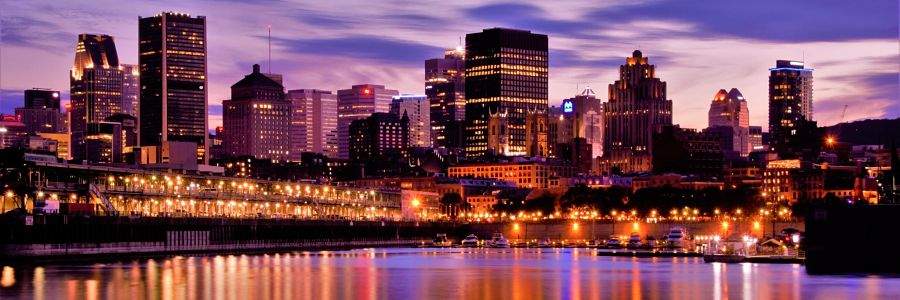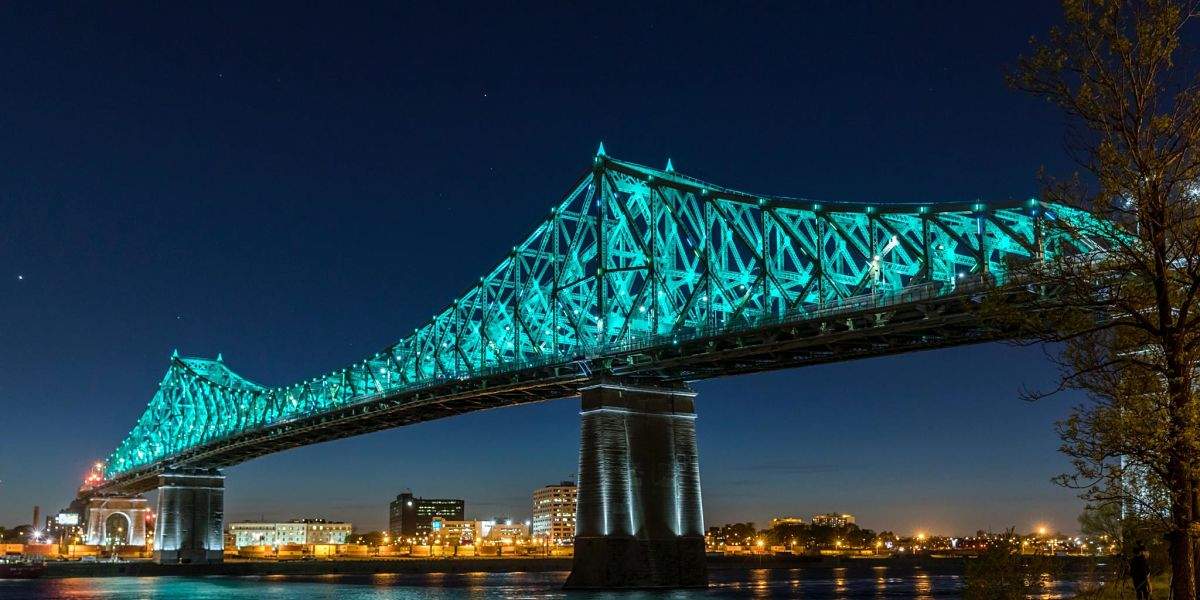Originally inhabited by the St. Lawrence Iroquoians, it was ‘discovered” by Jacques Cartier in 1953 who was the first European to set foot in the city now known as Montreal.
About Montreal
The second-largest city in Canada, Montreal is located in the province of Quebec. With ties to both the French and British empires, Montreal is a fully bilingual city with a fascinating origin story.

The French established a fortress for fur trading with plans for French Expansion but in 1760 when the French were defeated in the Battle of the Plains of Abraham, the British took over. This resulted in an influx of English speaking British people immigrating to Montreal.
The city officially became recognized as one in 1832 and it was established as the capital city of the United Province of Canada for a period of five years (1844-1849). By 1860 Montreal was playing an enormously important role as the economic and cultural centre of Canada. In short, it was the place to be and where all the action was happening.
In many ways, this is still the case today. Over the following 150 odd years, Montreal has gone through its fair share of change with conflicts, struggles, celebrations, immigration, etc. but the city still remains an iconic and integral part of the fabric of Canada.
Below we’ll tell how to move to Montreal and why this city is a good choice for immigration. One step that would make the application process easier would be hiring an RCIC.
Montreal Today
It is the second-largest in Canada and ninth-largest in all of North America with an estimated population of 4.2 million, the majority of which come from a European background or origins:
- French (26%)
- Italian (7%)
- Irish (6%)
- English (4%)
- Scottish (3%)
- Spanish (2%)
Before the 1980s the number of visible minorities in Montreal was little to non-existent at only 5%. In the last 40 years, the number has increased to over 30%, meaning more and more immigrants are choosing to settle here.
Although French is the primary and official language of the city, almost 60% of the population is fluent in both English and French.
Why Moving to Montreal?
Moving to Montreal is a good idea in terms of practicality. And in terms of much more than just practicality.
When compared to cities like Vancouver or Toronto, the cost of living in Montreal is much lower and more affordable for families looking to maintain a nice, middle-class life without breaking the bank. The median income in Montreal in 2018 was roughly $62,000 and although house prices are going up, they are still in the realm of possibility and affordability for a middle-class family unlike cities such as Vancouver where a simple detached home can cost buyers over a million dollars!
From coast to coast Canada is beautiful at every turn. Whether it’s the majestic mountains in the West, the lush, sweeping greenery of in Ontario, or the endless stretches of clear water of the Maritimes.
Each province and city has its own unique history, charm, and beauty. And Montreal is no different. In fact, it is the only city in Canada where you can get a distinctly European flair and feel without actually being in Europe! Come see it for yourself!
Imagine waking up to the gentle clip-clop of hooves on the cobbled streets of the Old Port, or strolling through the pathways, admiring the beautiful architecture while you stop to admire the collections at one of the many art galleries. Or simply sitting on a terrace, coffee, and delicious pastries on hand. Can life get any more Parisian?
Montreal also boasts some of the best-dressed people and it’s no surprise given the never-ending choices of fashionable boutiques, high and low-end shopping.
The picturesque beauty of the Old Port is just one of Montreal’s many charms and attractions, with its lively nightlife scene, gay village, and quiet suburbs… It’s a city that caters to the tastes of young, old, gay, straight.
Moving to Montreal could be a good idea for those who enjoy large-scale events. Summers in Montreal are vibrant and lively with one festival after another. Some of the best-known events that take place in Montreal every year are:
- Grand Prix Weekend
This is essentially the fancy, Montreal way of saying Formula 1 Race Weekend. Taking place in early June of every year, the weekend is a non-stop, action-packed one with exclusive parties, celebrities, and of course flashy cars!
- Just for Laughs Festival
The JFL Festival follows soon after Formula 1 and some of the funniest and most famous comedians around the world take to the stage to make you laugh your head off.
- Osheaga Festival
Love music? Then you’ll love Montreal’s outdoor indie-music festival held every year in July-August. Nothing says summer like dancing barefooted to your favourite band under the stars.
- International Fireworks Competition
Another hugely popular and well-known event is the Fireworks Competition. Taking place on certain nights throughout the summer, it is truly a breathtaking sight to behold.
These are just some of the many events and attractions, which make Montreal so popular and such an attractive place to live in and it doesn’t just stop there!
Montreal: Something for Everyone
As Montreal’s population has grown and become more culturally diverse so has the city! Spread throughout are various ethnocultural neighbourhoods that can either make you feel right at home or give you a peek into the flavour and aroma of another culture. Some of the more well-known neighbourhoods are:
Piccola Italia:
Located at Mile End, Little Italy can easily be accessed by three different metro lines as well as buses. It is famous for its pasta dishes and pastries (can we say cannoli?). It also hosts one of the most famous public markets in Montreal, the Jean-Talon Market. Open year-round, you’ll find everything here. Fresh produce and flowers in the summer, pastries and hot chocolate in the winter!
Chinatown:
Situated conveniently near the Place-d’Armes metro stop, Chinatown can be found in the De La Gauchetiere street in Montreal. Lively, alive, and full of delicious smells, this place is buzzing with shops, restaurants, tourists, and Montrealers.
Little India:
Have a sudden craving for some sizzling tandoori chicken or sweet gulab jamun? The neighbourhood of Park Extension is the place to go. Approximately 33,000 people live in the neighbourhood known locally as Park Ex. With shops, houses, restaurants, religious and cultural centres the area is buzzing with all things India, Bangladesh, and Pakistan from clothes to cuisine.
Weather in Montreal
If there is a drawback in the whole idea of immigration to Montreal, it would be the weather. Unlike Toronto which at times enjoys warmer and balmier winters, Montreal winters can be extremely cold. But the efficient and very convenient metro system (linking the city from one end to the other) ensures you don’t spend too much time freezing outdoors. And if you happen to work in the downtown core, you’ll never need a jacket or boots since everything is connected underground! In fact, Montreal’s Underground City is just another reason to love the city. Connecting eleven different towers together and stretching across 32 km, the underground city has malls, offices, restaurants, metros, and even condo buildings! Those lucky enough to live nearby never have to brave the winter snow.

Education and Employment in Montreal
Some people immigrate to Montreal for educational purposes. Montreal is home to two very well respected and famous universities, Concordia and McGill. Concordia University has an amazing MBA program while McGill is known for its Law and Medicine. Both universities have excellent programs and welcome hundreds of international students every year.
What happens after you graduate? Montreal plays a significant role in Canada’s economy and is a thriving centre of commerce, technology, global affairs, culture, finance, and technology. Companies such as Google, Facebook, Microsoft Research, etc. all have a presence in the city.
As the largest inland port around the world, the Port of Montreal is a key player in Canada’s imports and exports. The port handles over 25 million tonnes of cargo every year and transports a host of things including grain, consumer goods, petroleum, etc. Going hand in hand with the ships are trains and the headquarters of the Canadian National Railway is located in Montreal.
How to Move to Montreal, Quebec
Being such a culturally diverse, affordable, and beautiful city, Montreal is rapidly becoming a destination of choice for new immigrants. Lots of those who immigrate to Montreal come from French-speaking countries. However, as mentioned above, the population of Montreal is beautifully diverse.
Some immigration options available for people looking to come to become Permanent Residents in Montreal or Quebec are as follows:
Quebec Experience Program
You can get a PR in Montreal with this program, as long as certain eligibility criteria are met. The most important one is you must possess very strong French language skills (advanced to intermediate).
Secondly, you either need to have work experience in Quebec or have studied in the province. If applying under work experience, you will need to show at least 12 months of full time working experience and will need to be working at the time of application.
If you are applying because you have studied in Quebec, you will need to prove you have either completed a post-secondary program or will complete on within six months. Most programs that are two years or longer meet this requirement, however, there may be some exceptions. For a full list of eligibility requirements check out their website.
Skilled Worker Program
The option to enter Quebec as a skilled worker is undergoing some changes and under Canadian law, Quebec has the right to select its own immigrants (as long as they meet the requirements for entry to Canada).
In order to go the Federal skilled worker route, you will need to apply for a Certificat de selection du Quebec (CSQ). You will need to be at least eighteen years of age and need to demonstrate your intent is to settle in Quebec and be employed. Strong preference is given to French-speaking applicants.
If your CSQ is approved by Quebec, you then need to submit a permanent residency application that an IRCC officer will review and make a decision on.
Investor Program
A popular option if you are financially well off with a net worth of at least C$2,000,000. You must demonstrate management experience and be willing to make a five-year investment of at least C$1,200,000 with Investissement Quebec – Immigrants Investisseurs Inc.
Other factors such as language skills, age, education, criminal record, etc. will also play a role in whether you are approved or not.
If none of these seems like suitable options, consider Family Sponsorship, Refugee Resettlement, Caregiver Program, and Supervisa.
See You In Montreal
As you can see, there are various ways of moving to Montreal and many reasons for doing so. However, the best way to truly know whether a place is for you or not is to visit. Before you decide to immigrate to Montreal, hop on a plane or a train and come spend a week or two in Montreal. Don’t visit like a tourist but like a native. Take the metro, walk the streets, go grocery shopping, take in a show or event. Go for a stroll in the Old Port on a summer night and watch the fireworks, grab a beavertail and hot chocolate and take in the snow….
Ask yourself, could you live here? Would you be happy here? Is this for your family? If you think the answer is yes, consider your career or educational options and have the conversations you need to.
Where you decide to settle and live permanently can be a big decision and you may have a lot of questions or be unsure of where to start and what to do, so consider getting advice or guidance from an RCIC agent.
Canada2036 is here to help you in every manner possible!







